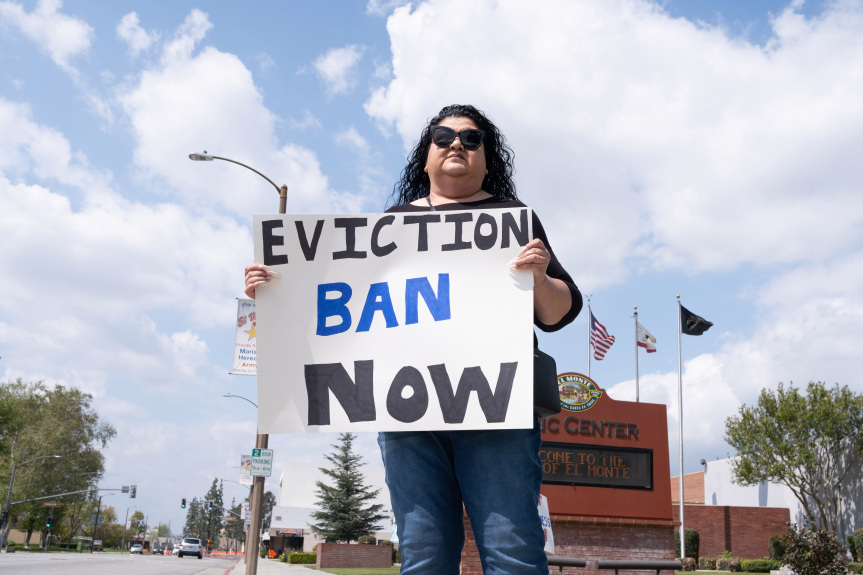If homeownership is the American dream, then being a renter has become the national nightmare.
The coronavirus has exposed, no less amplified, the huge gap between the haves (who primarily own) and the have-nots (largely renters). And let’s be honest, this economic chasm is also split along racial lines. Without additional government intervention designed for the less fortunate, a satisfying economic recovery for all will remain a long-term dream.
The killer virus has hit lower-income populations particularly hard — people who typically have poorer health overall and less access to top-shelf medicare care.
The pandemic’s economic wallop has savaged key service industries such as dining, entertainment and tourism. These businesses employ a huge chunk of Americans who earn less than average pay — and they most often are renters.
And while some of the initial government stimuli eased early economic harm — and, yes, some of it looked generous to low-income folks — any sense of societal generosity seems to be over, for now.
The extra $600 in weekly jobless benefits from the U.S. government is done. President Donald Trump’s executive order (seemingly more of a suggestion) for an ongoing $400 weekly stipend has been largely ignored. Promises of another stimulus check for all is tied up in congressional politics.
Folks out of work, out of luck, or simply without resources face a bleak future. The ongoing pandemic looks to have put a cap of further economic rebounds for now. And that’s bad news for renters.
Then comes another harsh blow. Many of the legal protections tenants had against pandemic-related evictions appear to be ending. In California, barring quick legislative relief, landlords can once again start the eviction process Sept. 2.
That’s an ugly shift for the huge flock of Americans who can’t afford rent. According to one tally of major landlords, 13% of tenants nationwide hadn’t made any August rent payment as of the middle of the month.
Yes, amid a pandemic whose current best salve is keeping social distance, financially challenged renters may be forced into unhealthy housing situations — from sharing cramped quarters to homelessness.
But don’t blame the landlords for doing what landlords do: collect the rent.
One look at the noteworthy rebound in housing sales reveals why the renter vs. owner gap is so wide.
Slashing mortgage rates to historic lows has benefitted those folks who have the financial wherewithal to borrow. And the Federal Reserve has made sure the mortgage market remained stable by aggressively buying up loans as part of its stimulus efforts.
This gift helped push summer’s home sales back to or above 2019 levels after an ugly springtime tumble. Prices, fueled by what amounts to roughly a 10% boost in house hunter’s buying power, are setting record highs.
Cheap money meant mortgage refinancings approximately doubled this spring. Owners (a decidedly upscale class) with steady jobs (not financially hurting) got a cash benefit that will last for decades.
Even the 4 million U.S. homeowners who can’t pay their mortgages got a sweet deal: essentially no payments for a year with the unpaid balances due in some cases not until the long-term mortgage is finished. Or, if an owner is truly desperate, they could sell into a housing market that’s short on inventory.
I’m not shaming those who have bought or refinanced or took a loan forbearance. But contrast the size of the help the ownership industry got to the cash-strapped renter who faces eviction. Unless tenants have a generous landlord or stashed cash to quickly pay off months of missed rent checks, they are in big trouble.
Yes, I know most folks who own — including myself — have made major sacrifices to control their housing destiny. But renters deserve an equitable slice of government largess.
Yes, it makes macroeconomic sense to use housing sales as a way to give short-run assistance to the overall business climate.
And, yes, the pandemic may have transformed how many folks view ownership. That psychological switch is an additional plus for the home-selling business.
But the broad economy isn’t going to fully recover if we don’t find a cure for the renter’s plight.
This distressed crowd will be a magnet for government resources as it demands additional financial aid and other services. Renters’ diminished consumer spending also will be create longer-running drag on the economy.
Don’t forget the rental-property owners, too. If landlords don’t get paid, they don’t spend either. Or they dump scores of properties on the market.
So pick a fix. Funds for renters. Financial aid for landlords. Make it cash payments or tax breaks. Create further delays in evictions. Mix and match from that list of helpers. Perhaps do something innovative nobody’s thought of before.
Or you can bet that the renter’s nightmare doesn’t have a ghostly end for the entire economy.










